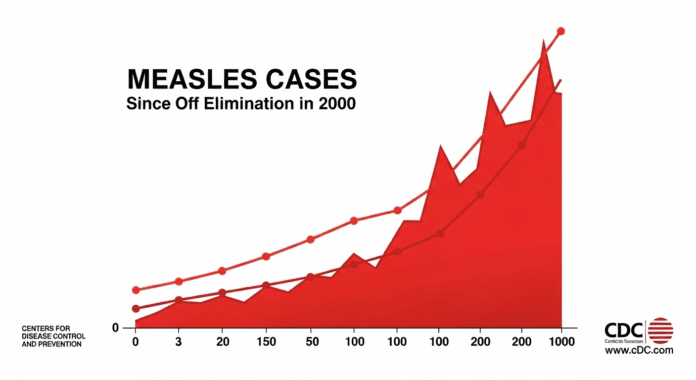America Faces Its Worst Measles Outbreak in Decades as Vaccination Rates Fall
The United States is facing its largest measles outbreak since the disease was declared eliminated in 2000. As of July 2025, the CDC has confirmed 1,288 measles cases across 39 states and territories, surpassing the previous record set in 2019. This surge—driven by declining vaccination rates, rampant misinformation, and policy shifts—has reignited urgent calls for action from public health leaders. Below is a comprehensive analysis of the current situation, the underlying factors, and the broad implications for public health.
The Alarming Numbers Behind the Measles Comeback
A Historic Setback
Measles was declared eliminated in the United States in 2000 after decades of successful vaccination campaigns. In 2025, however, the country has reported 1,288 confirmed cases—more than any year since elimination. The CDC has warned that the nation risks losing its elimination status, which requires no continuous transmission for 12 consecutive months. The reversal highlights the fragility of public health gains when vaccine coverage declines (CDC).
Where the Outbreaks Are Concentrated
The outbreak is not uniformly distributed. Texas leads the surge with 753 cases, followed by New Mexico and Missouri among others. A total of 27 outbreak clusters have been identified, with 88% of the cases associated with these clusters. The majority of infections are found in unvaccinated individuals, particularly children under the age of 19. Tragically, three measles-related deaths have been reported—the first such fatalities in the U.S. in over a decade (USA Today).
Why Measles Is Surging Again
Falling Vaccination Rates
One of the primary reasons for the resurgence is the decline in MMR (measles, mumps, rubella) vaccination coverage. The national rate among kindergartners has fallen to 92.7%, well below the 95% needed to maintain herd immunity. In certain counties such as Gaines County, Texas, nearly 25% of kindergartners remain unvaccinated, leaving over 280,000 children vulnerable to the virus.
The Role of Misinformation
Widespread misinformation regarding vaccine safety has compounded the problem, fueling vaccine hesitancy. Social media platforms have played a significant role in the dissemination of false claims—ranging from debunked links between the MMR vaccine and autism to exaggerated warnings about side effects. A recent poll reported that 63% of adults encountered false information regarding the MMR vaccine, with 33% believing these vaccines pose greater risks than measles itself. Prominent figures, including Health Secretary Robert F. Kennedy Jr., have further undermined public confidence with statements that contradict well-established scientific consensus.
“Vaccines are the safest and most effective way to prevent measles and other infectious diseases,” stated Dr. Paul Offit, a leading vaccine expert.
Policy and Leadership Challenges
Federal and state-level policy changes have also contributed to the situation. Decisions such as dismissing the CDC’s vaccine advisory panel and an increase in vaccination exemptions have left more children unprotected. Critics argue that these policy shifts, often framed by political considerations rather than scientific evidence, have eroded hard-won public health protections. Dr. Sean O’Leary, chair of the American Academy of Pediatrics Committee on Infectious Diseases, noted, “These policies have saved millions of lives, and undermining them is dangerous.”
The Public Health Response
Emergency Vaccination Campaigns
In response to the outbreak, the CDC and various state health departments have initiated emergency vaccination campaigns. Special vaccination clinics have been established in schools, community centers, and even airports targeting regions with low vaccine uptake. For instance, Texas has seen an eightfold increase in early vaccination rates among infants compared to 2019, and New Mexico has nearly doubled its MMR vaccine administration efforts within the past year.
Combatting Misinformation Through Communication
Public health agencies have ramped up their communication strategies to counter vaccine misinformation. Social media campaigns, televised public service announcements, and localized outreach efforts are central to these initiatives. The CDC’s “Be Ready for Measles Toolkit” is a key resource, providing local health departments with educational material designed to dispel myths and promote factual, science-based information.
Community and Parental Reactions
The response on the ground has been mixed. Many parents express frustration over the lack of clear federal guidance, while praising local health departments for their responsive and accessible vaccination services. Public sentiment is polarized; while some communities rally behind the renewed emphasis on vaccines, others remain skeptical due to longstanding mistrust in governmental public health policies.
The Stakes—And What Comes Next
The Cost of Complacency
Measles is far from a benign childhood illness. It can result in severe complications, ranging from pneumonia and encephalitis to permanent brain damage and death. The 2025 outbreak has already led to 155 hospitalizations and stretched healthcare resources in affected areas. Moreover, the economic burden of outbreak containment—including vaccination drives, contact tracing, and public education—amounts to millions of dollars in direct and indirect costs.
Broader Implications for Public Health
The resurgence of measles is an ominous signal, with the potential to influence the control of other vaccine-preventable diseases. Lower vaccination rates may also open the door for the re-emergence of diseases like polio. Importantly, the ongoing politicization of vaccine policies is eroding public trust in scientific institutions, which could have long-lasting impacts on community health and disease prevention efforts.
A Call to Action
The 2025 measles surge serves as a stark reminder that the fight against vaccine-preventable diseases is far from over. Public health advancements over decades can be swiftly undermined by complacency, misinformation, and policy missteps. Robust vaccination coverage remains the cornerstone of disease prevention, and it is imperative for both policymakers and communities to act decisively. Restoring confidence in vaccines, ensuring science-driven decisions, and executing timely public health interventions are essential to safeguarding our children and future generations.
“We cannot afford to lose our measles elimination status. The health of our nation’s children depends on it,” warned Dr. Bruce A. Scott, President of the American Medical Association.
Now is the time for every parent to verify their family’s vaccination status, engage with trusted healthcare providers, and commit to preventing further spread of this dangerous virus.




